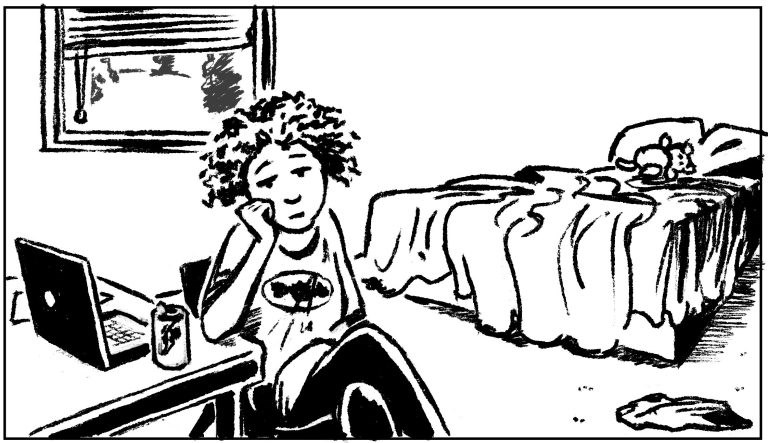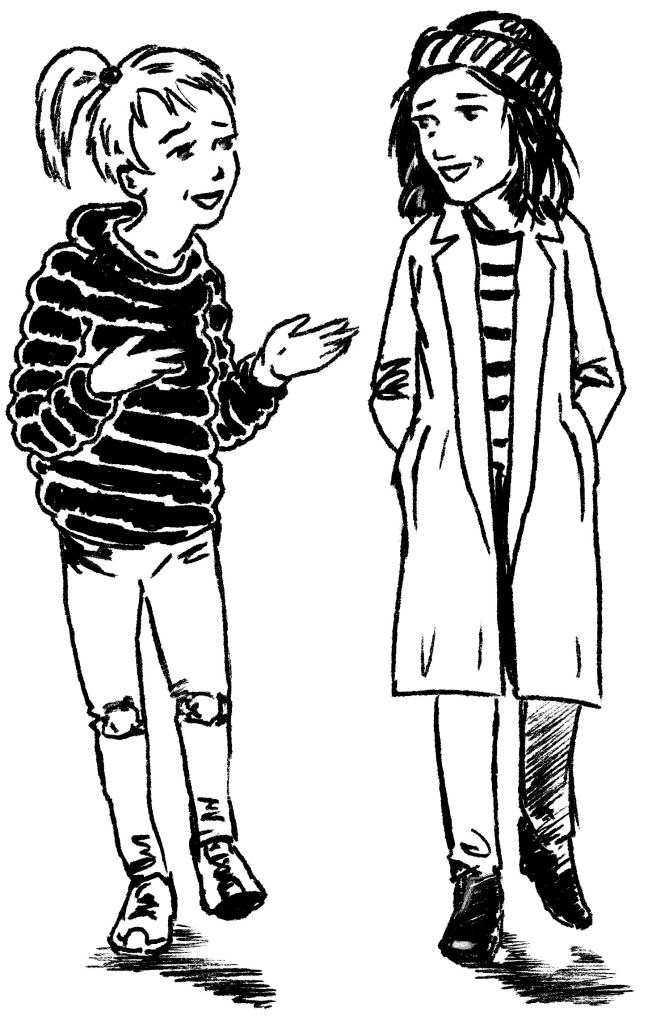Becoming a social-emotional mentor was never on Jackie Ferris’ radar; however, she is thrilled it’s where she has landed. Jackie describes what she does as being similar to a life coach, but more like being the Aunt Jack you never knew you needed.
These have been challenging times, for everyone, and Jackie knew she could help. Her recently launched mentoring program, Comrade Morpho, supports youth by offering genuine warmth, compassion and fun. This proactive approach creates a barrier between teens and the stresses in their lives, and has stabilizing effects on their social, emotional and physical well-being.
Following the signs to more meaningful work
Jackie has fond childhood memories of growing up in Fergus. Like many, her younger years also had their share of difficulties; parents divorcing, her rebellious and defiant teenage years, and losing her mother to cancer just before Jackie left for college.
She was resilient, but the impact of these stressors caught up with Jackie in her mid-twenties. Despite living her dream life in Vancouver, she was gaining weight, struggling with exhaustion and had lost her sense of joy. A doctor noticed the early symptoms of depression and recommended self-help books for Jackie to read, which she did not.
Fast forward a few years, and Jackie is now in the throes of extreme depression and anxiety. The symptoms were so severe that she required the urgent help of a clinical counsellor. Together they navigated difficult emotions during frequent appointments over several years. This experience not only put Jackie on a healing path, but it kick started her obsession with the importance of taking care of our mental health early.
We’re stronger together
In 2016, Jackie received a distressed phone call from a sister in Elora. Jackie’s nephew, who was 24 at the time, had been admitted to Homewood with signs of psychosis. Without hesitation, she moved back to support her family. Jackie explained, “I wanted them to know that they weren’t alone.”
When Jackie’s nephew was released, she moved in with him. She provided comfort and support and did what she could to make life feel a little recognizable. Some days they did nothing but watch The Office on TV, but when opportunities presented, she gently encouraged him off the couch to go for walks or have emergency dance parties together in the kitchen. She said, “Having me there also gave my sister peace of mind. She knew he was ok when she wasn’t with him, and it gave her the opportunity to rest.”
Jackie’s nephew enrolled in 1st Step, a service provided by CMHA. Jackie and her sister would attend family support meetings together. “I could see how tired and overwhelmed the other families were as well. I wished I could offer support to them in the same way, but I had to focus on getting a job now that I was staying in Ontario.”
We need human connection
Instead of finding a job, Jackie’s passion for mental health was reignited and she enrolled at the University of Guelph to study Psychology and Fine Art. She explained “I wasn’t convinced I wanted to be a psychologist, but I hoped that I would find inspiration for a fun and creative way that I could help make people feel better for a living.”
Midway through her degree, the pandemic hit, and classes moved online. The semester ended mid-lockdown, and that’s when Jackie’s anxiety and depression returned. “I was embarrassed that I had no hobbies to keep me busy. I’d just sit there, doom-scrolling for hours.” She was feeling the negative impact of not being able to interact with her family, friends and classmates, and that’s when the importance of social connections hit her like a tonne of bricks. “I woke up one day, and I realized that people are my hobby. I love spending quality-time connecting 1-on-1 with the people in my world.”
Being a Big Sister
With a new appreciation for the healing qualities of relationships, Jackie volunteered as a mentor with Big Brothers Big Sisters. When first matched with her Little Sister, the pre-teen was reluctant and withdrawn. Once a week, they would get together to do art projects, cook healthy meals, or thrift shop for Halloween costumes. “In the beginning, conversations were pretty one-sided, but I knew I had to keep showing up to earn her trust.”
After a few months, Jackie noticed a different girl walk out the front door. The now 13-year-old had put obvious effort into her appearance this time. Jackie explained, “She was looking super stylish for our plan to get Starbucks and go for a walk downtown. I took it as a sign that we were making progress and building her confidence.”
They continue to meet once a week, and while together, her Little Sister fills Jackie in on what’s going on in her life;
- Celebrating that her grades have been improving
- Her newfound confidence for doing class presentations
- Getting back into reading and making art at home
- What’s making her feel nervous about starting high school
Jackie boasted, “I even know who she has a crush on, but I’ll never tell!”
By providing an intentionally nurturing and supportive relationship, Jackie has become another trusted adult in her Little Sister’s life. She concluded, “Now when I drop her off, we sit in my car for an extra 10 minutes because she’s not done talking yet. The first time that happened was when I realized that this is exactly what I want to do for a living.”
Youth thrive from high-quality relationships

Studies demonstrate that youth do better, in all aspects of life, when they have a strong web of adult relationships supporting them. Without the sense of love and belonging those relationships provide, youth struggle mentally and physically. Establishing a web isn’t always easy, for various reasons. Examples include;
- Being new to town
- Being a single parent
- Parents with demanding careers
- No or undesirable extended family nearby
- An introverted and/or socially anxious child
Recognizing that her patient, non-judgemental and friendly approach had a stabilizing and positive impact on her nephew and Little Sister, Jackie wanted to offer the same kind of experience to others.
Jackie recently launched Comrade Morpho, a social-emotional mentoring program, to help families of all circumstances feel supported.
How does a mentor help?

Unlike therapy, this is a preventative approach. If signs of low self-esteem, anxiety and/or depression are just beginning, a supportive relationship can stop it from getting worse, when it is easier to do so. Jackie takes a passive approach to help build confidence, encourage and support growth, and influence happy and healthy habits.
Teenagers are trying to establish their identity separate from their family. Jackie said, “A lot of parents have a difficult time because they see their teens struggling and want to help, but even the most loving and sound parental advice can be swiftly dismissed at this age.” Jackie is there to offer positive adult support and guidance at this crucial time in their development, when they are establishing their place in the world.
What is Comrade Morpho?

To earn the trust of a teen, it requires time and consistency before any real influence is possible. Comrade Morpho is a 1-year program that includes 8-10 hours of one-on-one time with Jackie, divided between up to 4 sessions each month. Mentees have access to Jackie through text/chat between sessions to keep in touch, just like a real friendship.
She calls the sessions “hangouts”, and what they do together depends on the interests, challenges and goals of each individual mentee. Their time can be spent in the community, enjoying nature, or hanging out at Jackie’s place. While the activities are casual in nature, the time together allows Jackie the opportunity to gently nurture their social and emotional wellness and influence positive habits.
Jackie does all of the pickups and drop-offs and activity costs are included. Plus, if there is an opportunity to celebrate her mentee, a graduation or recital for example, Aunt Jack will be there.
Comrade Morpho is currently accepting new mentees.
If you and your child could benefit from this type of support, reach out to schedule a free, 1hr consultation with Jackie. Additionally, she offers a complimentary 1hr hangout with potential mentees to make sure they want to spend all that time with her.
To connect with Jackie Ferris: Call/Text (226)343-5648 or Email: [email protected]
Comrade Morpho
Social-Emotional Mentoring
Guelph & surrounding areas
Ages 10+
Visit the website here.
.jpg;w=960)